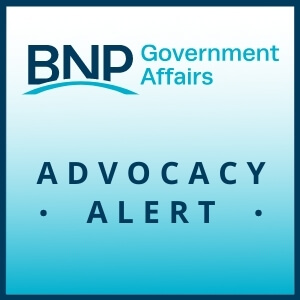Legislative priorities: BNP’s reaction to the Executive Budget
The Partnership
February 26, 2025
Blog Categories
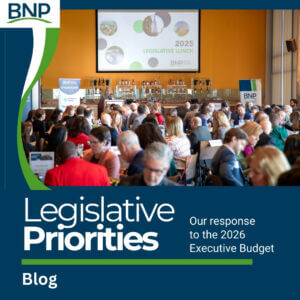 As part of our pro-employer mission, the Buffalo Niagara Partnership closely examines New York State Governor Hochul’s Executive Budget each cycle to identify proposals that will support our region’s economic growth and those that may negatively impact local businesses.
As part of our pro-employer mission, the Buffalo Niagara Partnership closely examines New York State Governor Hochul’s Executive Budget each cycle to identify proposals that will support our region’s economic growth and those that may negatively impact local businesses.
On February 14, we set the stage for critical discussions about the future of New York State’s economy by convening regional business leaders and policymakers, along with BNP members, at the 1970 Club in KeyBank Center for our Legislative Luncheon. Our members had the opportunity to hear from and engage with state legislators on the issues that matter most to them.
What we support
BNP backs several key proposals that align with our efforts to drive economic development, workforce growth, and business competitiveness in Western New York, including:
✅ Delaying Cap-and-Invest implementation to prevent unnecessary cost burdens on employers.
✅ Pursuing nuclear energy as a stable, long-term power solution.
✅ Closing the pay frequency loophole to ease compliance for businesses.
✅ Expanding incentives for housing development to address affordability.
✅ Joining the Interstate Licensing Compact for nurses to alleviate workforce shortages.
✅ Paying down COVID-era Unemployment Insurance (UI) interest, reducing financial strain on employers.
✅ Boosting site prep investments like FAST NY and POWER UP to attract business development.
✅ Investing in semiconductor supply chains to strengthen NY’s role in advanced manufacturing.
✅ Enhancing childcare funding and expanding the Child Tax Credit to support working families.
✅ Providing capital investment in public & private universities to develop a skilled workforce.
✅ Improved pay for Direct Support Professionals who care for New York's most vulnerable populations.
What we oppose
Not all proposals in the Executive Budget align with our region’s best interests. We are pushing back on policies that would increase costs, deter investment, or weaken regional business growth, including:
🚫 The NY HEAT Act and other gas bans, which would drive up energy costs and limit choices for businesses and consumers. While the Governor excluded this from her proposal, it is expected to be included in the Legislature's plans.
🚫 Weakening the Brownfield Cleanup Program, a vital tool for redevelopment and economic revitalization. We urge the Governor to continue her defense of the BCP against legislative proposals that would harm it.
🚫 Cuts to NFTA’s budget, which would hinder public transit reliability and workforce mobility.
Missed opportunities: Where Albany needs to step up
While the Executive Budget includes some positive provisions, critical areas were left unaddressed:
❌ No policy action on the benefits cliff, leaving many workers in a difficult financial situation when they seek career advancement.
❌ No extension of Renaissance Commerce Park BCP credits, missing a chance to drive industrial development in our region.
❌ The need to adjust course on Zero Emission Vehicle & Advanced Clean Truck Rule, which could impose undue costs on businesses without the necessary infrastructure in place.
State leaders we heard from
Attendees had the chance to discuss these pressing legislative priorities with Senator & Mayoral Candidate Sean Ryan, Senate Minority Leader Rob Ortt, Assemblymember Karen McMahon, Assemblymember Paul Bologna, and many other representatives serving the region. Additionally, we heard from one of Gov. Hochul's top deputies in NYS Homes and Community Renewal, Alexa Sewell.
The relaxed, informal setting made it easy for BNP members to speak with their State Senators and Assembly Members about challenges they face—and how Albany can help, or hinder, business growth in Western New York.
Next steps: Continuing the conversation
BNP’s Legislative Luncheon was a key moment in our ongoing advocacy efforts, but it’s just the beginning. We will continue working with state leaders to refine budget priorities that impact our members and our regional economy. With major federal changes underway, New York’s state budget carries even greater significance this year in ensuring that our region remains competitive, economically viable, and business-friendly.
Want to stay engaged? Join BNP’s advocacy efforts to ensure your voice is heard in Albany. Learn more here.













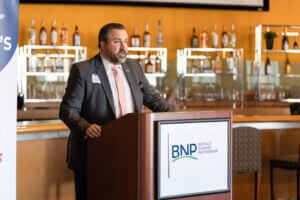
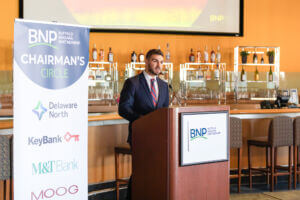





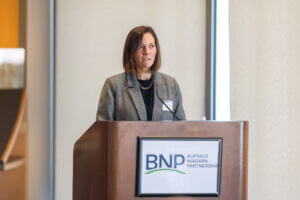
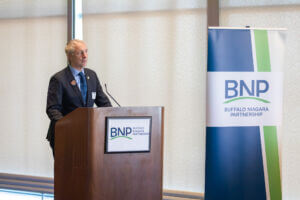
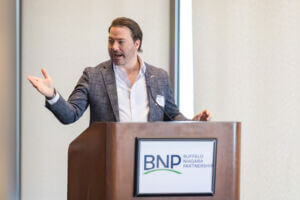


Related Posts
12.17.21 Advocacy Alert: Canada to Again Require Testing for Entry
Today, Canadian officials announced they would be reinstating a requirement that all entrants present proof of a negative COVID-19 test.
The requirement will take effect Tuesday, according to the Buffalo News.
NY’s Tax Climate Again Ranks at National Bottom
Today, the Tax Foundation (an independent tax policy think tank) released its 2022 State Business Tax Climate Index. The report compares all fifty states on various tax policies, then ranks their overall business tax climate. New York ranked below every state except New Jersey.
NY’s rank in the State Business Tax Climate Index
The poor ranking comes as no surprise. New York has oscillated between 48-50 for over ten years. After enacting new tax increases this year, New York dropped from 48th to 49th.
12.13.21 COVID-19 Bulletin: Statewide Mask Mandate Now in Effect
Yesterday, Governor Kathy Hochul announced she would repeal the state’s mask mandate, effective today. However, her announcement did not proactively address how the repeal coincided with the NY HERO Act, which would have required employees in most workplaces to continue masking.
12.2.21 Advocacy Alert: BNP Urges Hochul to Maximize Infrastructure Investment
The BNP recently wrote to Governor Kathy Hochul suggesting steps she can take to maximize the incoming infrastructure investment from Washington.
President Biden recently signed into law the bipartisan Infrastructure Investment and Jobs Act. The BNP advocated for this bill, which has the potential for transformative change in Buffalo Niagara. However, in our current landscape, this historic investment may not go as far in New York as it will in other states.

